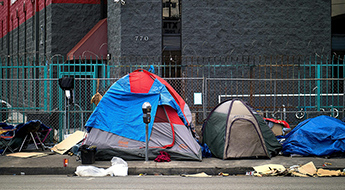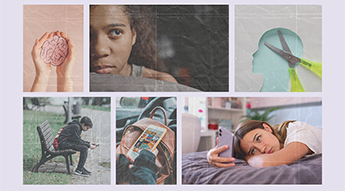Closed for School, Closed for Democracy
A new book examines links between school closings and democratic disillusionment in Black and Brown communities
Get all our news
People express fatigue and disappointment and disillusionment with American democracy because they do everything democracy asks of them, but they find democracy is still closed to them. ”
Sally Nuamah
IPR social policy expert

When IPR social policy expert Sally Nuamah attended a Chicago community meeting in 2012 about potentially shutting down a school, she heard residents discuss the closure like it was “life or death,” talking about schools as community centers and safe havens for children to access a better life.
 Nuamah grew up in Chicago’s Near North neighborhood and watched area schools lose students after residents moved when public housing closed. The population changes raised questions about what to do with these low-enrollment schools. In that meeting, she began to see Chicagoans make connections between keeping schools open and their political participation.
Nuamah grew up in Chicago’s Near North neighborhood and watched area schools lose students after residents moved when public housing closed. The population changes raised questions about what to do with these low-enrollment schools. In that meeting, she began to see Chicagoans make connections between keeping schools open and their political participation.
In Nuamah’s new book Closed for Democracy (Cambridge University Press, 2022), she investigates mass school closings in Chicago and Philadelphia in 2013 and how Black citizens who were affected by these closings mobilized politically to keep their schools open. She shows that ultimately the lack of response to their needs—either through closing schools or lack of investment in their schools—led to disillusionment with the government.
IPR spoke to Nuamah about her new book, the implications of her findings, and what voters’ responses to the 2015 election can tell us about how Chicagoans are thinking about education as the April 4 mayoral election approaches.
This interview has been edited for length and clarity.
You coined the term collective participatory debt to describe the feeling of fatigue that citizens experience when they repeatedly engage in politics but they don't get the response that they want. How does this concept fit into your book?
One thing that political scientists talk about is how the social contract is such that people vote and/or organize people at polls, for example, and that their participation translates to some kind of responsiveness from a local or national political leader in the form of policy change. That's typically how the democratic social contract should work.
What I find in Closed for Democracy is that you have a group of people who engaged in what would be model citizenship—they do everything that a democracy would demand of a group that wants to secure change. But they don’t experience democratic responsiveness. And this contributes to their fatigue and disillusionment with the political system.
In particular, I find that not only do affected groups protest these school actions by organizing on the ground, [but] they also attend the community meetings that are required by the school district to make their concerns known. Then they go a step further after these community meetings to try to work for an elected school board by creating petitions.
We also see them turn out to vote in the election right after the mass school closings in 2013—the election in 2015 with [incumbent] Rahm Emanuel. At the time, it was competitive with Jesús “Chuy” García. The people engaged across the board, even though they have low resources and backgrounds that would make it such they have less time to engage in political action.
Collective participatory debt is asking what do they get for becoming these model citizens: Do they actually experience the responsiveness that's commensurate with their participation? It's basically finding that they don't. Because people from these low-income, under-resourced backgrounds take the little resources they have, and they put it towards engaging in political action. The fact that they don't experience commensurate democratic responsiveness has high costs on their physical, emotional, and political wellbeing.
People find that, even if they are able to save a school or two, that they don't actually get the structural changes that they're hoping for, which is no school being closed or more funding for their schools. Even if you are able to save the school, you realize that this is really a small issue in a larger set of concerns that continues to make the situations and circumstances of people like you untenable. People express fatigue and disappointment and disillusionment with American democracy because they do everything democracy asks of them, but they find democracy is still closed to them.
What were some of the differences and similarities in the school closings and the way that citizens responded when you looked at Chicago and Philadelphia?
Chicago and Philadelphia both experienced mass school closures around the same time, and both had these pretty segregated populations that were impacted by it. In both cases, 90% of those who were impacted by school closures were Black and low-income, as well as Brown, young people in the school districts. Also, across the board you saw that people who were impacted by it—so Black and Brown people in this context—were largely unsupportive of these closures.
But one difference that we saw is that in Philadelphia, you have a more expanded charter school system. At the time of the study, I think over 30% of public schools in Philadelphia were a charter. And I think that's grown since then. This creates a context where you also have charter schools closing. And at this point, because it's such a large part of the Philadelphia public school system, there's a lot of Black and Brown people who attend them and care about the outcomes for those schools.
Unlike with public schools [in each city], where there's a mayor you could vote out because he's the one who appoints the school board, so you know where to draw the line of accountability, for charter schools, they don't have the same democratic accountability structure. It may take six months and 30 community meetings to close a school in a place like Chicago where they're largely public, traditional public schools. In a place like Philadelphia, it can happen overnight.
You describe in the book how short-term wins that community members experienced by keeping their schools opens that are often followed by long-term losses. Can you share kind of an example of this?
In the book, I talked about Steel Elementary in Philadelphia. Steel Elementary was located on the northwest side of Philadelphia, which is an area that was largely low-income and Black. And there's a woman who I chronicle in the book, who finds out that the school is threatened to be closed through email and decides to organize parents in the community to protest the closure.
She ends up organizing 200 parents to attend a community meeting to voice their concern about the closure. And at the community meeting, they're able to make a case that successfully keeps Steel Elementary from closing.
But about three years later, when I returned to Philadelphia, I found that Steel Elementary was a completely different institution. Even though the school remained open, the principal and [most of] the staff were fired. And this created a context where the culture and community of the school that had fought to remain open had largely been eliminated.
And that's not what they fought for. They fought for their school to stay the [same] community that it was and for them to get more resources to help it thrive. When the principal and the staff were fired, this impacted the morale of the institution. As community members felt betrayed, enrollment started to plummet. Eventually, it became subjected to other turnaround policies, literally a year or two later.
These persistent experiences with fighting with the district to run your school or engage in school or go to school as normal wears on parents who already have low resources. And over time, they start to see that even if they win, they lose.
Why do mass school closings undermine democracy for Black Americans?
For most Americans, because public schools are provided at no cost, they become the mechanism for taking kids born at a disadvantage and facilitating their political and social mobility.
When a school closes, this raises important questions about how we can ensure that disadvantaged young people who most benefit from public schools can still experience positive life chances. We also know from political science that most Americans learn about democracy through the institutions they interact with the most. For many people that is schools. When you are a six-year-old Black child, and you learn that your school is being closed, because it's “a bad school,” you're getting one of your earliest lessons about democracy.
From that experience you're learning about the ways that political leaders value people who look like you and your positionality in American democracy as a citizen.
This also has important implications for your desire to participate in politics in the future. In particular, those I study become less interested in participating in politics. But when you're already from a disadvantaged background, your participation in democracy is the only way historically that you have received any kind of political or social change.
How should we be thinking about Chicago's mayoral election based on what your book shows about how citizens in Chicago responded to former mayor Rahm Emanuel's bid for re-election after the mass school closings in 2013?
It’s especially relevant. You have Paul Vallas, who was the previous CEO of Chicago Public Schools, as well as the previous CEO of Philadelphia Public Schools. And in both contexts, he played an important role in creating the conditions that made school closure possible. And you have him going against Brandon Johnson, who is a former educator and a union organizer, and someone who is supportive of traditional public schools and is providing alternatives to closures, for example, by putting health centers and clinics in most schools.
In the book, I talk about the racialized nature of support for school closures. A lot of White, middle-class people in Chicago expressed high levels of support for closures, whereas Black and Brown people who were most subjected to school closures had negative attitudes towards them. And I think in the split that you see between Paul Vallas and Brandon Johnson, there's a similar way in which that's materializing and who we see Chicago is supporting.
I don't think it's a coincidence that the contentious 2015 election between García, who was endorsed by the Chicago Teachers Union and who also endorsed Brandon Johnson, and Rahm Emmanuel, who led the closures of Chicago Public Schools—is a part of the long lineage that we see in the election today.
It's also not a coincidence that school issues are on the political agenda, because school issues are where people learn about politics and their value as citizens. At the same time, I think that the fact that it's a contentious battle at all has to do with the fatigue and the fallout of the previous disappointments that have been experienced by groups that have tried to fight for a different kind of future.
Sally Nuamah is assistant professor of human development and social policy and an IPR fellow.
Photo credit: S. Drey
Closed for Democracy was award the American Political Science Association’s Ralph J. Bunche Award, Dennis Judd Award, and the Best Book Award from the Race, Ethnicity & Politics section. It also was named a finalist in the Government and Politics category of the Association of American Publishers’ 2024 PROSE awards and won the W.E.B Dubois Distinguished Book Award from the National Conference of Black Political Scientists.
Published: April 3, 2023.


